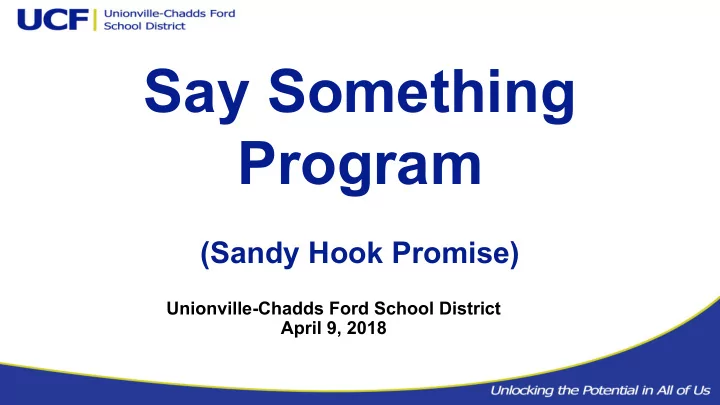

Say Something Program (Sandy Hook Promise) Unionville-Chadds Ford School District April 9, 2018
Why Are We Considering an Additional School Safety Program? Heightened concern about student wellness and school safety based on: • UCFSD – Pennsylvania Youth Survey data • National trends related to student depression and mental health • National and local events concerning school and student safety • Feedback from community members that we need more resources focused on student wellness
Presentation Purpose Say Something Program Overview What is it? How will students be trained? Program sustained? What are the anticipated reporting rates? What will be the possible impact and benefit for UCFSD? Questions and Comments from the Wellness Council Program Resources Timing and next steps?
Say Something Program Overview Goal of the Program = KEEPING SCHOOLS SAFE •The program focuses on the following: Look for warning signs, signals, and threats. Act immediately. Take it seriously! Say something to a trusted adult. Carry it forward. -NEW to the program is the App (SS-ARS)
Say Something Program Overview ● Wellness Council Subcommittee met with SHP representatives and reviewed the program. ● School Counselors, School Social Workers, and District Administrators reviewed the program. ● Findings: ○ The program aligns well with current UCFSD curricula and support structures. ○ Multiple avenues for reporting at-risk behavior are beneficial to school safety. ○ Committee continues to investigate as questions arise ● Administration recommends implementing this program for 2018-19 school year. ○ 3-year commitment requested by SHP ○ Administration will evaluate effectiveness of the program annually
What is the Program? • The program teaches youth to recognize warning signs and signals, especially within social media, from individuals who may be a threat to themselves or others and then to Say Something to a trusted adult. • Parent, teacher, counselor, clergy • If they are unable or unwilling to do that they will have the option to report their concerns anonymously on the anonymous reporting system. (Secondary Students)
What is the Program? • Adults also can report information anonymously if they are unable or unwilling to report it to school or law enforcement officials. • The program goals fit well with our existing anti-bullying program – Olweus. • Teaches students to be upstanders rather than bystanders – to report bullying behavior to a staff member and/or to their parent.
How it Works - Anonymous Reporting System
How it Works - Anonymous Reporting System 24/7 Crisis Center, with multi-lingual counselors, receives all phone, web, mobile app anonymous “tips.” The 24/7 Crisis Center reviews, triage and dispositions tips to the appropriate assigned district operations personnel and/or local police department … disposition would be based on District defined protocols. The SS-ARS Platform provides 24/7 access by District assigned individuals to all tips, dispositions and reports. The platform is used in thousands of schools and by CrimeStoppers USA.
How it Works - Anonymous Reporting System • Currently our school district receives information on a variety of concerns in which we investigate. Anonymous tips now must be followed up on. • Information that comes from this reporting tool will be handled in a similar fashion. • The platform does provide an opportunity for us to document we have investigated the tip.
HOW will training be delivered? Sustained? • Students: SHP National trainers or in health (train-the-trainers), or self-led (interactive training). Can be followed up and supported through Olweus lessons in the MS. • Multi-disciplinary teams in Schools : SHP SS-ARS trainers and national trainers lead in-person training • Sustain Say Something in schools and homes ‒ - Embed Say Something in existing school clubs ‒ - In-school information (posters, announcements, etc) ‒ - SHP employee district support - annually train/refresh ‒ - Parent training provided by SHP - FOCUS has offered to facilitate ‒ parent training.
WHAT are the anticipated reporting rates? SHP reports • 4-10% of population trained will submit a tip once all students are trained and receive regular communication about the program • Approximately 10-15% of qualified tips will be life-safety tips • Suicide, suicide ideation, depression, anxiety, substance abuse, school violence, and bullying/cyber-bullying will likely be some of our tip submissions • • We can expect less than 1% of tips to be false reports
Impact and Benefits SHP reports that they have reviewed longitudinal data from Colorado and Michigan which demonstrate: • Fosters “upstander” culture • Reduction in violence, suicide, and cutting • Reduction in bullying, drug use and overall victimization • More students getting help / safer and healthier environment
Questions – Comments From Wellness Council • General support for program • How many reports can we expect? Can we handle/process what may be coming? • Need more information from other districts using anonymous tools • Garnet Valley, West Chester • How can we always support/encourage talking to a trusted adult as the best/first option? • What about false reports? Are there concerns about students being targeted?
Questions – Comments From Wellness Council • Like that there are multiple ways to report concerns • Questions on the anonymous reporting app • Does it stay anonymous • Will it reduce face to face communication
Next Steps - Timing Continue to review program - develop FAQs May: Recommending to School Board for approval Pending Board approval May/June: Staff and Community Review June: System setup by SHP and SS-ARS Admin June: Formal admin training June: Program testing / trial Aug/Sept: Student and educator training Sept: System goes live at schools Ongoing: Training and sustaining
Say Something Resources • Say Something General Brochure (2018) • Say Something Additional Facts (2018) • Say Something Parent Brochure (2016) • Say Something Community Guide (2016) • Say Something Student Guide (2016) • Say Something Examples (2016) • Say Something Educators Guide (2016)
Thank You to the Wellness Council for your work with reviewing this program.
Recommend
More recommend